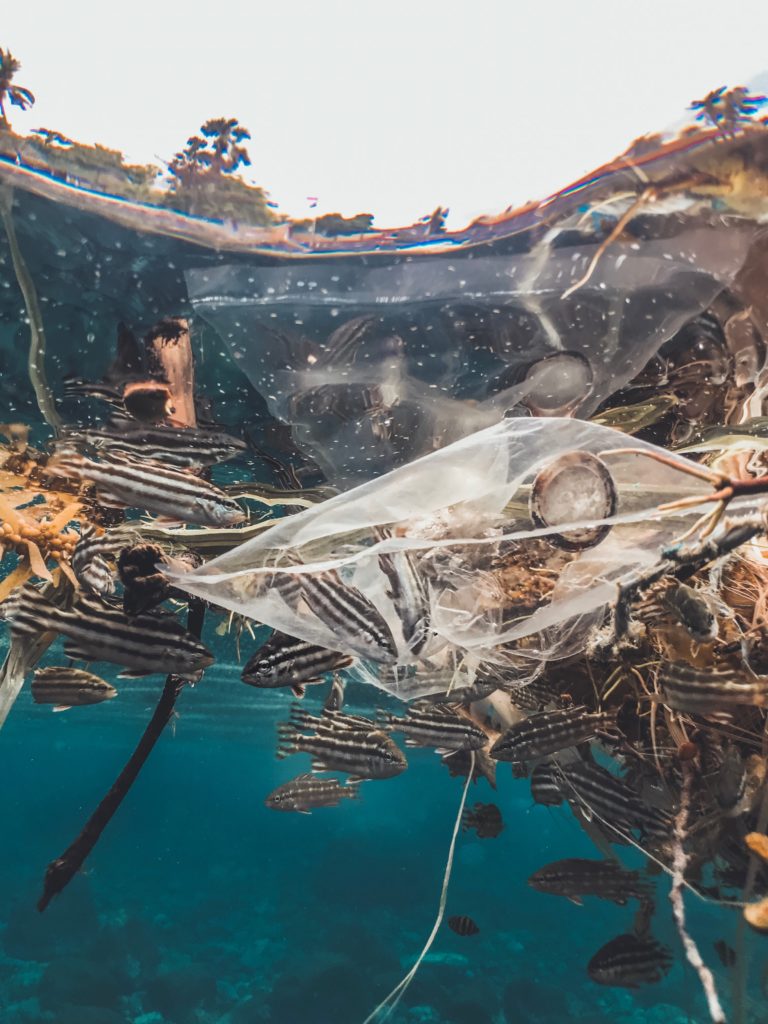The world discards 300 million tons of plastic annually. Much of this material—which takes more than 400 years to disintegrate—accumulates in the environment and breaks down into microplastics and nanoplastics. These tiny particles cycle through the atmosphere and enter the soil, air, and ocean. Because of that, plastic waste is in all places—from the interior of insects in Antarctica and placentas to the snow in the Arctic.
In 2015, scientists estimated that almost 60% of seabirds had plastic in their stomachs. Ocean and beach dwellers are the major victims of the plastic problem, many of which die choking or entangled in plastic pieces. Leaching toxic chemicals, plastic debris also hampers plant growth, disrupts the human endocrine system, and causes imbalances in different ecosystems—including remote ones, where clean-up movements cannot happen.
Besides these issues, a new study is calling attention to global disturbances arising from plastic pollution. According to this study, the world could be nearing a scenario in which plastic waste starts to interfere with large-scale environmental mechanisms. Plastic pollution could diminish the efficiency of carbon sinks—aggravating climate change—and cause wide-ranging biodiversity loss due to changes in nutrient supply, exposure to hazardous materials, and increased water temperature. The snowballing effects of these interactions could push the world to an irremediable tipping point.
Plastic waste generation continues to increase. The already-catastrophic situation has reached new levels since the COVID-19 pandemic, as 129 billion single-use plastic masks were discarded every month. Nations with proper infrastructure continue to export plastic debris to countries that lack the conditions to manage waste correctly—Europe, for example, sends 46% of its plastic debris to Southeast Asia. On top of that, few plastics can go through the recycling process without loss in performance. Because of these limitations, only 9% of the global plastic waste is recycled each year. If these conditions are maintained, reaching a tipping point does not seem absurd.

Fish Entangled in Plastic Debris.
Scientists have said it is too late to clean up the ocean, triggering feelings of powerlessness and doom throughout the world. Nevertheless, each day new technologies and scientific discoveries have been making the headlines, offering hope. For example, superworms (Zophobas atratus) can accelerate the decomposition of polystyrene plastic due to a strain of bacteria that lives in their guts. Cows also host bacteria that can disintegrate plastic. Additionally, a type of plastic that degrades quickly by UV radiation now exists. Due to increasing demands, different companies have been transforming (especially ocean) plastic waste into clothes and shoes.
Another group of scientists suggested that if governments and industries make use of solutions that are currently available, the world can cut down the volume of plastic substantially. These solutions encompass: stopping the production of virgin plastic (see a call for a global treaty here), banning the export of waste, expanding the infrastructure for waste treatment across the world, transforming debris into high-value products, and substituting plastic for compostable materials.
Recently, scientific advancements favored the production of bioplastics from the byproducts of grasses, corn stubble, and mesquite, as well as from wood. A team of researchers is attempting to tackle the “biodegradable controversy” by turning so-called biodegradable cutlery into a foam that serves as insulation material. Another group has found that the widespread bacteria E. coli can convert degraded plastic into vanillin—the compound that gives vanilla its smell and taste.
New technologies, however, are not enough to end the pollution problem. At the individual level, reducing plastic consumption is also key. Different initiatives currently support citizens in adopting a cleaner or even plastic-free lifestyle. Projects such as No More Plastic, the Zero Waste Movement, and several educational materials offer guidelines on how to eliminate plastic use. These movements have stimulated the creation of spaces for discussion, creating a broad network of support and inspiration. They have also favored the birth and proliferation of zero waste and plastic-free shops and products, all of which meaningfully contribute to a cleaner world.

Zero Waste Products by EcoPanda.
Nevertheless, going plastic-free is not feasible for many. In the majority of places, plastic-free options are significantly more expensive than plastic or plastic-packed goods. Countless people cannot obtain bamboo toothbrushes or olive oil in a glass bottle. In Brazil, for instance, the price of plastic-free products can cost, on average, 60% more. Especially for large families—who produce more plastic waste—opting for greener products can be prohibitive. Dedicating time to crafting DIY products can also be challenging to many.
For scientists and healthcare professionals, single-use plastics are great allies in controlling infections and ensuring safer and faster procedures. Plastic gloves, masks, vials, syringes, and pipettes offer greater protection and are more resistant, resilient, and easier to transport—which is crucial in emergencies. The COVID-19 pandemic has also shown that even the most conscious person can opt for a less environmentally-friendly choice to feel better protected.
However, even if there are real reasons preventing people from going plastic-free, many are dwelling on guilt. That happens either due to eco-shaming or a sense of personal responsibility. Overall, especially because dire scenarios overload the news each day, every individual effort toward sustainability may seem insufficient. As psychologists put it, impotence capped with guilt can lead people to give up on taking action in the long-term.
To avoid that, the feeling of agency should overpower eco guilt. Inhabiting the same home, all humans share common responsibilities and can contribute to a more sustainable future, even if only taking baby steps. Researching, sharing knowledge, passing laws, caring, acting, and motivating each other, everybody can continuously engage more hands in the fight to prevent a tipping point and ensure a cleaner world.
Also by Natalia: Pantanal, The Most Wildlife-Dense Region In The World, Is Burning
Get more like this—Sign up for our daily inspirational newsletter for exclusive content!
__
Photo: Unsplash




